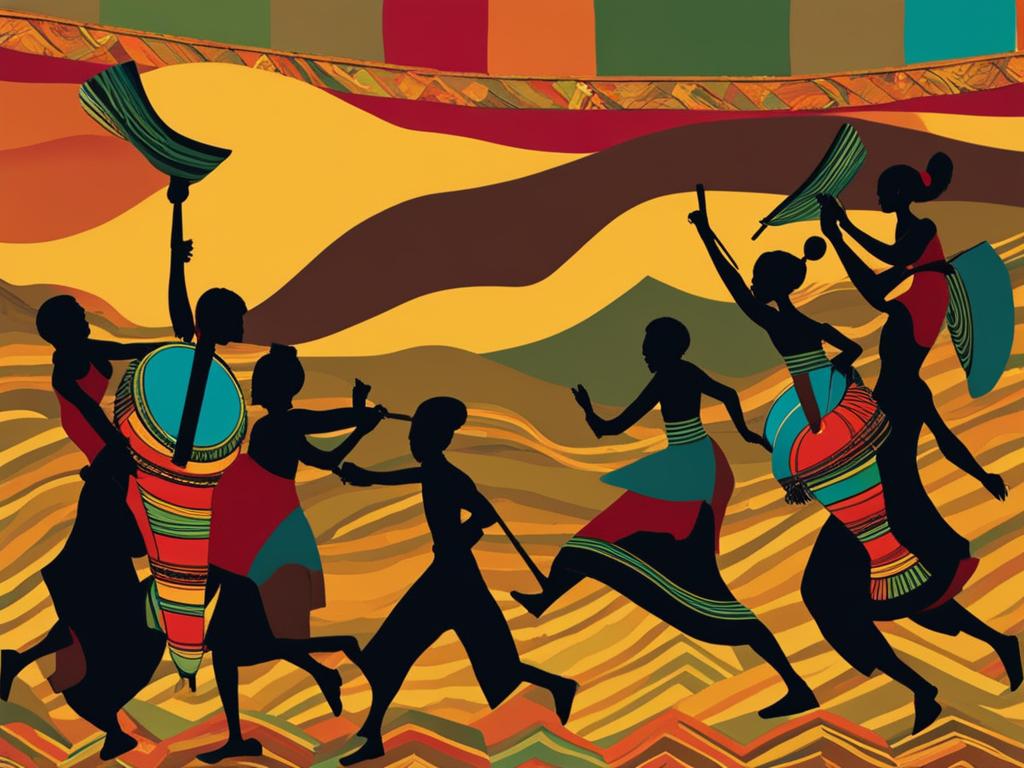- African music is a captivating art form that encompasses a rich cultural heritage and diverse musical traditions. From the rhythmic beats of traditional African music to the contemporary sounds of African artists, the melodic journey through the world of African music is truly enchanting.
Through centuries of history, African music has played a significant role in African societies, serving as a form of communication, storytelling, and cultural expression. From the traditional melodies passed down through generations to the fusion of sounds influenced by global genres, African music reflects the vibrant and dynamic cultures of the continent.
Discover the fascinating history, explore the diverse genres, and delve into the captivating rhythms and melodies of African music. Join us on a journey that celebrates the cultural significance and global influence of this extraordinary musical tradition.
Key Takeaways:
- African music is a diverse and vibrant art form that has captivated audiences around the world.
- It encompasses a rich cultural heritage and diverse musical traditions.
- African music has played a significant role in African societies, serving as a form of communication, storytelling, and cultural expression.
- There is a wide range of traditional music styles to explore, from West Africa’s highlife to South Africa’s mbube.
- Traditional African music is often characterized by the use of unique and fascinating instruments.
The Impact of African Music
African music has made a lasting impact on the global music scene, with numerous African artists achieving international recognition and success. These talented musicians have not only brought the sounds of their cultures to audiences around the world but have also contributed to the diversity and popularity of contemporary African music.
African music festivals have emerged as popular events that celebrate the rich musical traditions of the continent. These festivals provide a platform for both established and emerging African artists to showcase their talents and connect with fans from different parts of the world. They offer a unique opportunity to experience the vibrant energy and cultural richness of African music.
African Music Artists African Music Festivals Contemporary African Music Yemi Alade Felabration Afrobeats Burna Boy Cape Town International Jazz Festival Afrofusion Angelique Kidjo Essence Festival Durban World music Moreover, the influence of African music can be seen in various genres of popular music worldwide. African rhythms, melodies, and instruments have been incorporated into different styles, creating a fusion of sounds that captivate audiences. This cross-pollination of musical ideas has contributed to the richness and diversity of world music, showcasing the global impact of African musical traditions.
African Music Artists Making Waves
- Yemi Alade: Known as the “Queen of Afrobeats,” Yemi Alade has gained international fame with her energetic performances and powerful vocals. Her music combines traditional African sounds with contemporary pop and dancehall influences.
- Burna Boy: With his unique blend of Afrofusion and reggae, Burna Boy has become one of Africa’s most successful and acclaimed artists. His music tackles social and political issues while delivering infectious beats.
- Angelique Kidjo: A Grammy-winning artist, Angelique Kidjo has been at the forefront of promoting African music on the global stage. Her music draws inspiration from various African traditions, creating a melting pot of sounds that defy categorization.
“African music is a powerful force that transcends borders, connecting people through rhythm, melody, and dance.” – Yemi Alade
The Diversity of African Music Genres
African music is incredibly diverse, with each region and country having its own unique styles and genres. From the rhythmic beats of West Africa’s highlife and juju music to the soulful melodies of South Africa’s mbube and Zimbabwe’s chimurenga music, there is a wide range of traditional music styles to explore. Additionally, contemporary African music has been influenced by various global genres, resulting in a fusion of sounds that include dance music and pop music.
To better understand the diversity of African music genres, let’s take a closer look at some key regions:
West African Music
West Africa is known for its vibrant and energetic music styles. Traditional music from this region often features complex rhythmic patterns, with percussion instruments like djembe and talking drums taking center stage. Genres like highlife and juju music incorporate elements of jazz, funk, and Afrobeat, creating an infectious and danceable sound.
Sub-Saharan African Music
Sub-Saharan Africa is home to a wide variety of musical styles. In countries like Nigeria, Ghana, and Senegal, Afrobeat and Afro-pop have gained international popularity. These genres blend traditional rhythms with Western influences, resulting in catchy melodies and infectious grooves. Other sub-Saharan African countries have their own unique styles, such as soukous in Congo and mbaqanga in South Africa.
North African Music
North African music has its own distinct sound, heavily influenced by Arabic, Berber, and Andalusian traditions. Countries like Morocco, Algeria, and Tunisia are known for their rich musical heritage, featuring instruments like the oud, qanun, and darbuka. Traditional North African music often combines intricate melodies with rhythmic patterns, creating a captivating and hypnotic experience.
Region Music Genres Key Characteristics West Africa Highlife, Juju, Afrobeat Complex rhythms, energetic percussions, fusion of jazz, funk, and Afrobeat Sub-Saharan Africa Afrobeat, Afro-pop, Soukous, Mbaqanga Blend of traditional rhythms and Western influences, catchy melodies, infectious grooves North Africa Andalusian, Berber, Arabic Intricate melodies, rhythmic patterns, fusion of Arabic, Berber, and Andalusian traditions 
“African music is a treasure trove of diverse genres, each offering a unique sonic experience. From the lively rhythms of West Africa to the soulful melodies of South Africa and the captivating sounds of North Africa, African music showcases the richness and depth of the continent’s musical heritage. Whether you’re a fan of dance music or prefer the catchy hooks of pop music, there’s something for everyone in the world of African music.” – African Music Enthusiast
As African music continues to evolve and develop, it remains a powerful form of cultural expression and a source of pride for communities across the continent. With its wide range of genres, captivating rhythms, and soulful melodies, African music continues to captivate audiences around the globe and leave a lasting impact on the world of music.
Traditional African Music Instruments
African music is known for its distinctive use of traditional instruments, which add depth and flavor to the rhythmic and melodic elements of the music. These instruments reflect the rich cultural heritage of Africa and play an essential role in various African musical traditions. From percussion instruments to stringed instruments, each instrument offers a unique sound and contributes to the overall musical experience.
The Talking Drum
One of the most iconic instruments in African music is the talking drum. This drum is often referred to as the “talking drum” because it can imitate the tonal patterns of spoken language. It is a hourglass-shaped drum with a tensioned drumhead on both ends. By squeezing the drum’s strings or hitting the drumhead with a mallet, the player can produce different pitches and tones, allowing them to “speak” through the drum. The talking drum is commonly used in West African music, particularly in countries like Nigeria and Ghana.
Percussion Instruments
Percussion instruments are widely used in African music, adding rhythm and energy to the music. These instruments include drums, shakers, bells, and rattles. The djembe, a goblet-shaped drum, is one of the most popular percussion instruments in Africa. It is played with bare hands, allowing the player to produce a variety of tones and rhythms. Other percussion instruments like the shekere, a shaker made from a dried gourd with beads attached to it, and the balafon, a wooden xylophone with gourd resonators, are also commonly used in African music.
Stringed Instruments
Stringed instruments play a melodic role in African music. The kora, a 21-string harp-lute, is a prominent example of a stringed instrument in West African music. It is played by plucking the strings with the thumbs and index fingers, creating intricate melodies. The ngoni, a smaller stringed instrument resembling a lute, is another popular instrument in West Africa. It is known for its rhythmic capabilities and is often played during storytelling sessions. In East Africa, the stringed instrument known as the umuduri or inanga is widely used, producing soulful melodies that complement the vocal performances in traditional music.
Instrument Region Description Talking Drum West Africa An hourglass-shaped drum that can imitate tonal patterns of spoken language. Djembe West Africa A goblet-shaped drum played with bare hands, producing a variety of tones and rhythms. Shekere West Africa A dried gourd with beads attached, used as a shaker. Balafon West Africa A wooden xylophone with gourd resonators, creating melodic and rhythmic patterns. Kora West Africa A 21-string harp-lute played by plucking the strings with the thumbs and index fingers. Ngoni West Africa A smaller lute-like instrument known for its rhythmic capabilities. Umuduri/Inanga East Africa A stringed instrument producing soulful melodies in traditional music. The History of African Music
African music has a rich and diverse history that spans centuries and reflects the cultural heritage of the African people. The origins of African music can be traced back to the musical traditions of different indigenous groups, each with its own unique style and instruments. From ancient rituals and ceremonies to storytelling and cultural expression, music has played a significant role in African societies throughout history.
The musical traditions of Africa are deeply rooted in the oral traditions of the African people. Music was not only a form of entertainment but also a means of communication and connection with the spiritual world. Each tribe had its own musical style, reflecting the distinct cultural and spiritual practices of the community. For example, the Shona people of Zimbabwe have a rich musical tradition that is deeply intertwined with their spiritual beliefs and rituals.
African music is characterized by its rhythmic complexity, vibrant melodies, and use of a wide range of musical instruments. Traditional African instruments such as drums, xylophones, and stringed instruments like the kora and ngoni are integral to African music and add depth and texture to the melodies. The use of call and response singing, polyrhythms, and improvisation are also common features of African musical traditions.
The Shona People of Zimbabwe: Keeping Musical Traditions Alive
“Music is a way of life for the Shona people. It is not just about entertainment; it is a spiritual and cultural practice that connects us to our ancestors and preserves our heritage.” – Tendai Mupfurutsa, Shona musician
Key Elements of African Music Examples Rhythmic complexity West African drumming traditions Melodic diversity South African mbube and Zimbabwean chimurenga music Use of traditional instruments West African kora and East African ndingidi Call and response singing Ghanaian highlife music Polyrhythms and improvisation South African jazz Despite the influence of global music trends, African musical traditions continue to thrive and evolve, blending with contemporary styles and creating new sounds. From traditional folk music to the diverse genres found in different regions of Africa, the history of African music represents the resilience, creativity, and cultural richness of the African people.
Celebrating African Women in Music
African women have made significant contributions to the vibrant world of African music. From Nigeria’s Yemi Alade to Mali’s Oumou Sangaré, these talented artists have not only achieved global recognition but have also become symbols of empowerment and cultural pride. African women contribute to various genres, from traditional music to contemporary sounds, and their performances and presence in African music festivals are celebrated across the continent. The musical traditions and talents of women in Southern Africa, in particular, have had a profound impact on the African music scene.

African Women Making Waves in the Music Industry
“African women in music are breaking barriers and challenging stereotypes. They are embracing their cultural heritage while also pushing artistic boundaries.” – Music critic
African women in music are breaking barriers and challenging stereotypes. They are embracing their cultural heritage while also pushing artistic boundaries. These artists have not only become influential figures in the music industry but have also used their platforms to address social issues and advocate for change. From soulful ballads to infectious dance tracks, African women have showcased their versatility and talent, captivating audiences around the world.
Cultural Empowerment and Representation
Through their music, African women are reclaiming narratives and amplifying their voices. They are using their artistry to celebrate African culture, promote unity, and inspire generations to come. Their performances in African music festivals serve as a testament to their cultural significance and influence. These festivals provide a platform for African women to showcase their talent, connect with audiences, and collaborate with fellow musicians, fostering a sense of community and empowering future generations of artists.
African Women in Music Genre Notable Achievements Yemi Alade Afropop First female African artist to reach 100 million views on YouTube Oumou Sangaré World Music Grammy Award winner for Best World Music Album Sho Madjozi Gqom Won the BET Award for Best New International Act Tiwa Savage Afrobeats Named one of Time magazine’s 100 most influential people in 2020 These are just a few examples of the incredible talent and achievements of African women in music. Their influence extends beyond the music industry, inspiring and empowering individuals of all backgrounds. With their unwavering passion and dedication, African women continue to shape the landscape of African music, leaving an indelible mark on the culture and the hearts of music lovers worldwide.
The Influence of Traditional African Music and Dance
Traditional African music and dance have played a significant role in shaping contemporary African music. The rhythmic beats and intricate movements of traditional African dance have heavily influenced various genres, particularly in West Africa, East Africa, and South Africa. These regions are known for their vibrant and dynamic musical traditions, which have been passed down through generations.
In West Africa, traditional music and dance are deeply rooted in the cultural and spiritual practices of the indigenous communities. The energetic rhythms of the djembe drum and the melodic sounds of the kora create a captivating musical experience that is both mesmerizing and soul-stirring. West African dance forms, such as the energetic and expressive movements of the Afrobeats and Azonto, have become popular worldwide, inspiring contemporary African artists and global musicians alike.
In East Africa, traditional music and dance are characterized by the rhythmic patterns of instruments like the nyatiti and the mbira. The Swahili taarab music, with its rich melodies and poetic lyrics, is a prominent example of the region’s musical traditions. East African dance forms like the Makossa and Chakacha are known for their infectious rhythms and vibrant choreography, creating a lively and engaging atmosphere.
In South Africa, traditional music and dance are deeply intertwined with the country’s diverse cultural heritage. The pulsating beats of the African drums and the soulful sounds of the marimba showcase the rhythmic complexity and melodic richness of South African music. Dance forms like the Gumboot and Pantsula, with their intricate footwork and storytelling elements, reflect the resilience and creativity of the South African people.

The Influence of Traditional African Music and Dance
- Traditional African music and dance have heavily influenced contemporary African music.
- West Africa, East Africa, and South Africa are known for their vibrant musical traditions.
- West African dance forms like Afrobeats and Azonto have gained global popularity.
- East African music features instruments like the nyatiti and dance forms like Makossa and Chakacha.
- South African music showcases rhythmic complexity and melodic richness, with dance forms like Gumboot and Pantsula.
The fusion of traditional African music and dance with contemporary sounds has led to the evolution of various genres, creating a unique and captivating musical experience. Today, African musicians draw inspiration from their rich cultural heritage while incorporating modern elements to create innovative and genre-defying music. The influence of traditional African music and dance can be seen in the rhythms, melodies, and dance styles that continue to shape contemporary African music.
The Cultural Significance of African Music
African music is not just a form of entertainment; it holds deep cultural significance and is a reflection of the traditions and values of African societies. It serves as a powerful medium for storytelling, preserving history, and transmitting cultural knowledge from one generation to the next. African music is an integral part of everyday life, accompanying cultural celebrations, rituals, and ceremonies, and playing a vital role in social bonding and community cohesion.
One of the key aspects of African music culture is dance music. Dance is an essential form of expression in many African communities, and music is intricately woven into the fabric of dance. Different genres of African music include specific dance styles, each with its own significance and purpose. For example, in Southern Africa, traditional dances like the gumboot dance and the Zimbabwean jerusarema dance are performed during important cultural events and serve as a means of connecting with ancestral spirits. Dance music is not just a form of entertainment but a way to connect with one’s roots, express emotion, and celebrate African identity.
“Dance is the hidden language of the soul.” – Martha Graham
African Musical Traditions in Southern Africa
Southern Africa is home to a rich tapestry of musical traditions that have evolved over centuries. The region is known for its diverse cultural heritage, and this diversity is reflected in its music. One of the notable musical traditions in Southern Africa is the use of call-and-response singing, where a lead singer is accompanied by a chorus. This creates a dynamic interaction between the lead singer and the chorus, adding depth and harmony to the music. The musical traditions of Southern Africa often incorporate complex rhythms, polyphonic singing, and the use of traditional instruments such as drums, mbiras, and marimbas.
Traditional Southern African Instruments Key Characteristics Mbira An African thumb piano consisting of a wooden board with attached metal keys that are plucked to create melodies. The mbira is often used in spiritual ceremonies and storytelling. Drums African drums are central to the music and dance traditions of Southern Africa. They are played to provide rhythmic foundations and create energetic beats that accompany both traditional and contemporary music. Marimba A wooden xylophone-like instrument with resonators beneath each key, creating a vibrant and resonant sound. Marimbas are an integral part of traditional music and are often played in ensembles. The cultural significance of African music in Southern Africa extends beyond entertainment. It serves as a means of preserving cultural heritage, strengthening community bonds, and celebrating African identity. The vibrant rhythms, powerful vocals, and soulful melodies of African music continue to inspire and captivate audiences around the world, making it a treasure worth exploring and cherishing.

African Music’s Global Influence
African music has had a profound impact on the global music industry, influencing artists and genres across the world. From traditional rhythms to contemporary sounds, African musicians have captured the hearts and ears of listeners everywhere. The infectious beats and melodies of African music have transcended cultural boundaries and have contributed to the development of various genres, including world music and contemporary African music.
Contemporary African musicians have achieved international acclaim, bringing the rich and diverse sounds of their culture to global audiences. Artists like Fela Kuti from Nigeria, Miriam Makeba from South Africa, and Orchestra Baobab from Senegal have not only entertained but also inspired artists worldwide. The unique rhythms, melodies, and vocal styles of African music have influenced and shaped the sounds of genres such as jazz, reggae, funk, and hip-hop.
“African music is the foundation of so much contemporary music that we love; it’s the heartbeat, the soul, and the rhythm.” – Paul Simon
When exploring the influence of African music on global sounds, it is impossible to overlook the impact of North African and South African musical traditions. The North African region, with its rich heritage of Arabic and Berber music, has influenced the sounds of Mediterranean music and even genres like flamenco. South Africa, on the other hand, has given birth to powerful genres like mbaqanga and the soul-stirring, politically charged music of artists like Hugh Masekela and Miriam Makeba.
The global influence of African music is an ongoing journey that continues to shape the musical landscape. As African musicians collaborate with artists from different cultures and genres, the fusion of sounds creates a vibrant tapestry of music that celebrates diversity and cultural exchange. African music’s impact on the global stage remains strong, inspiring future generations of musicians and ensuring that the melodies and rhythms of Africa continue to resonate across continents.

The Future of African Music
African music is constantly evolving and shaping the global music landscape. With its rich cultural heritage and diverse musical traditions, African artists are pushing boundaries and exploring new musical styles, ensuring that the future of African music is full of promise and endless possibilities.
One of the key factors contributing to the future of African music is the growing recognition and appreciation of African music artists. From traditional musicians to contemporary trailblazers, African artists are gaining international acclaim and using their platforms to promote African culture around the world. The influence of African music festivals is also on the rise, with these events serving as important platforms for artists to showcase their talents and engage in cultural exchange.
As African musical traditions continue to evolve and adapt, collaborations between African artists and musicians from other parts of the world are becoming increasingly common. These collaborations not only bring diverse musical styles together but also create opportunities for cultural fusion and innovation. The future of African music will likely see the emergence of new musical genres and styles that blend traditional African sounds with contemporary influences.
Table: African Music Festivals
Festival Name Location Genre Essence Festival Durban South Africa Various Fespaco Burkina Faso Film and Music Cairo Jazz Festival Egypt Jazz Sauti za Busara Zanzibar, Tanzania Afrobeat Nyege Nyege Festival Uganda Electronic In conclusion, the future of African music looks bright and promising. As artists continue to explore and innovate, African music will continue to captivate audiences worldwide. The combination of traditional African musical traditions with contemporary influences, collaborations with artists from around the world, and the growing popularity of African music festivals all contribute to an exciting future for African music.

PJ Morton’s Transformative Journey Through African Music
In his quest to explore the depth and diversity of African music, Grammy-winning artist PJ Morton undertook a transformative journey across the continent. From Nigeria to Ghana, South Africa to Egypt, Morton immersed himself in the rich musical landscapes and collaborated with local artists, uncovering the profound influence of African music on his own sound.
Morton’s journey highlights the enduring power and relevance of African musical traditions. The melodies, rhythms, and storytelling techniques he encountered during his travels shaped not only his own music but also contemporary music worldwide. Through his experiences, Morton discovered the interconnectedness of African music with global sounds, reinforcing the significance of African musical heritage.
“Africa is the heartbeat of so much music that we listen to today,” Morton reflects. “It’s where the roots come from.”
From the traditional beats of West Africa to the soulful melodies of South Africa, the influence of African music can be heard across genres and continents. Morton’s journey serves as a testament to the power of music to transcend cultural boundaries and create connections that resonate with audiences around the world.
As we continue to appreciate the melodic journey of African music, let us celebrate the transformative experiences of artists like PJ Morton, who have embraced the traditions, rhythms, and melodies of Africa and integrated them into the fabric of contemporary music.
Also Read : Music Man Broadway: Your Guide To A Melodious Experience
Conclusion
African music is a vibrant and diverse art form that has captivated audiences around the world. The rich cultural heritage and musical traditions of Africa continue to inspire and influence artists globally. Exploring the depth and breadth of African music allows us to appreciate the unique rhythms, melodies, and stories that make it a melodic journey worth experiencing.
African music culture is a testament to the continent’s rich history and cultural diversity. From the traditional melodies passed down through generations to the contemporary sounds that push boundaries, African music reflects the spirit and soul of its people. The fusion of traditional elements with global influences has given rise to a wide range of genres, from the rhythmic beats of West Africa to the soulful melodies of southern Africa.
Understanding African music genres is an exploration of the continent’s musical landscape. Each region and country has its own unique styles and genres that contribute to the vibrant tapestry of African music. From the highlife and juju music of West Africa to the dance music and pop music found in contemporary African sounds, the variety of genres showcases the rich musical heritage of the continent.
Delving into African music history unravels centuries of cultural significance and musical evolution. The origins of African music can be traced to the indigenous groups and their unique musical styles and instruments. African music has always been more than just entertainment; it serves as a medium for storytelling, preserving history, and transmitting cultural knowledge. The Shona people of Zimbabwe and other African communities continue to celebrate and preserve their musical traditions, ensuring that the rich history of African music lives on.
FAQ
Q: What is African music?
A: African music encompasses a diverse range of musical styles and traditions originating from the continent of Africa, characterized by unique rhythms, instruments, and vocal techniques.
Q: What are some popular musical instruments used in African music?
A: Traditional African musical instruments include the djembe, kora, mbira, balafon, talking drum, and many more, each contributing to the rich and vibrant sound of African music.
Q: How has contemporary African music evolved over time?
A: Contemporary African music has evolved by blending traditional African musical elements with modern influences, leading to diverse genres such as Afrobeat, Afrobeats, and African hip hop, which have gained global popularity.
Q: What is the history and origins of African music?
A: African music has a rich history dating back centuries, with diverse indigenous cultures contributing to the development of unique musical expressions and traditions across the continent.
Q: How is African music typically notated and documented?
A: African music is often passed down orally and through performance, making use of various notation systems, including rhythmic patterns, vocal techniques, and instrumental arrangements, as well as modern methods of musical notation.
Q: What are some characteristics of traditional African music?
A: Traditional African music is known for its polyrhythmic textures, call-and-response patterns, use of percussion instruments, complex vocal harmonies, and ritualistic significance within indigenous communities.
Q: How has African music influenced other musical styles around the world?
A: African music has had a profound impact on various music genres globally, influencing jazz, blues, reggae, salsa, and other forms of world music, showcasing the widespread influence of African musical traditions.
Q: What role does music and dance play in African culture?
A: Music and dance are integral parts of African culture, serving as a means of communication, storytelling, social cohesion, and spiritual expression, reflecting the diverse traditions and values of African societies.
Q: What is the significance of African musical traditions in contemporary music scenes?
A: African musical traditions continue to shape contemporary music scenes worldwide, contributing to the diverse and dynamic musical landscape while preserving the authenticity and cultural heritage of African music.
Q: How does African music showcase the fusion of traditional and modern elements?
A: African music embraces a fusion of traditional and modern elements through innovative instrumentation, stylistic crossovers, and thematic lyrics, creating a dynamic musical tapestry that resonates with global audiences.
Source Links




